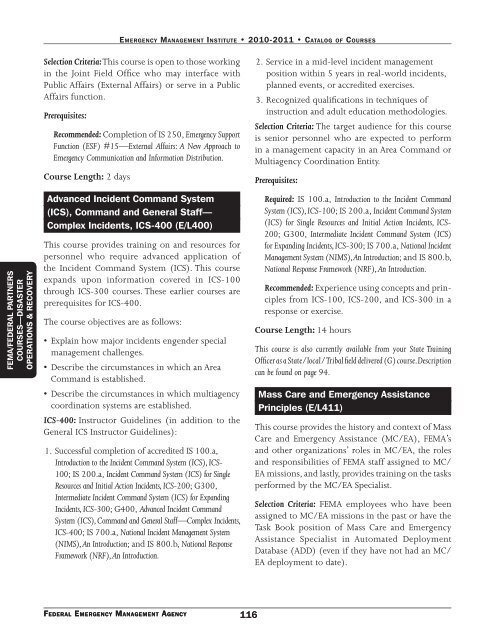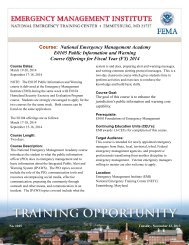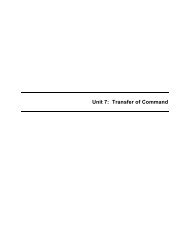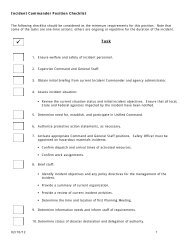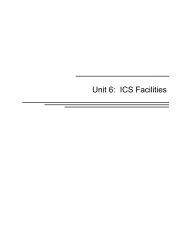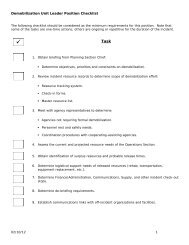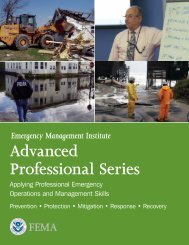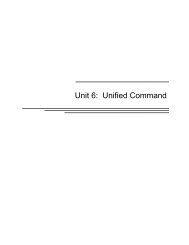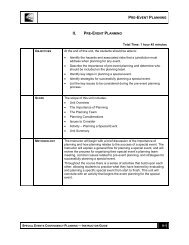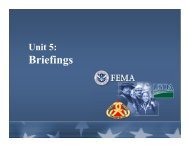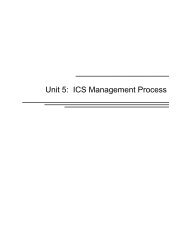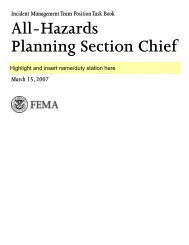enrollment for emi courses - Emergency Management Institute ...
enrollment for emi courses - Emergency Management Institute ...
enrollment for emi courses - Emergency Management Institute ...
You also want an ePaper? Increase the reach of your titles
YUMPU automatically turns print PDFs into web optimized ePapers that Google loves.
fEma/fEDEral partnErs<br />
cOursEs—DIsastEr<br />
OpEratIOns & rEcOvEry<br />
EmE r g E n c y ma n a g E m E n t In s t I t u t E • 2010-2011 • ca t a l o g of co u r s E s<br />
Selection Criteria: This course is open to those working<br />
in the Joint Field Office who may interface with<br />
Public Affairs (External Affairs) or serve in a Public<br />
Affairs function.<br />
Prerequisites:<br />
Recommended: Completion of IS 250, <strong>Emergency</strong> Support<br />
Function (ESF) #15—External Affairs: A New Approach to<br />
<strong>Emergency</strong> Communication and In<strong>for</strong>mation Distribution.<br />
Course Length: 2 days<br />
advanced Incident command system<br />
(Ics), command and general staff—<br />
complex Incidents, Ics-400 (E/l400)<br />
This course provides training on and resources <strong>for</strong><br />
personnel who require advanced application of<br />
the Incident Command System (ICS). This course<br />
expands upon in<strong>for</strong>mation covered in ICS-100<br />
through ICS-300 <strong>courses</strong>. These earlier <strong>courses</strong> are<br />
prerequisites <strong>for</strong> ICS-400.<br />
The course objectives are as follows:<br />
• Explain how major incidents engender special<br />
management challenges.<br />
• Describe the circumstances in which an Area<br />
Command is established.<br />
• Describe the circumstances in which multiagency<br />
coordination systems are established.<br />
ICS-400: Instructor Guidelines (in addition to the<br />
General ICS Instructor Guidelines):<br />
1. Successful completion of accredited IS 100.a,<br />
Introduction to the Incident Command System (ICS), ICS-<br />
100; IS 200.a, Incident Command System (ICS) <strong>for</strong> Single<br />
Resources and Initial Action Incidents, ICS-200; G300,<br />
Intermediate Incident Command System (ICS) <strong>for</strong> Expanding<br />
Incidents, ICS-300; G400, Advanced Incident Command<br />
System (ICS), Command and General Staff—Complex Incidents,<br />
ICS-400; IS 700.a, National Incident <strong>Management</strong> System<br />
(NIMS), An Introduction; and IS 800.b, National Response<br />
Framework (NRF), An Introduction.<br />
FEd E r A L Em E r g E N C y mA N A g E m E N T Ag E N C y 116<br />
2. Service in a mid-level incident management<br />
position within 5 years in real-world incidents,<br />
planned events, or accredited exercises.<br />
3. Recognized qualifications in techniques of<br />
instruction and adult education methodologies.<br />
Selection Criteria: The target audience <strong>for</strong> this course<br />
is senior personnel who are expected to per<strong>for</strong>m<br />
in a management capacity in an Area Command or<br />
Multiagency Coordination Entity.<br />
Prerequisites:<br />
Required: IS 100.a, Introduction to the Incident Command<br />
System (ICS), ICS-100; IS 200.a, Incident Command System<br />
(ICS) <strong>for</strong> Single Resources and Initial Action Incidents, ICS-<br />
200; G300, Intermediate Incident Command System (ICS)<br />
<strong>for</strong> Expanding Incidents, ICS-300; IS 700.a, National Incident<br />
<strong>Management</strong> System (NIMS), An Introduction; and IS 800.b,<br />
National Response Framework (NRF), An Introduction.<br />
Recommended: Experience using concepts and principles<br />
from ICS-100, ICS-200, and ICS-300 in a<br />
response or exercise.<br />
Course Length: 14 hours<br />
This course is also currently available from your State Training<br />
Officer as a State/local/Tribal field delivered (G) course. Description<br />
can be found on page 94.<br />
mass care and <strong>Emergency</strong> assistance<br />
principles (E/l411)<br />
This course provides the history and context of Mass<br />
Care and <strong>Emergency</strong> Assistance (MC/EA), FEMA’s<br />
and other organizations’ roles in MC/EA, the roles<br />
and responsibilities of FEMA staff assigned to MC/<br />
EA missions, and lastly, provides training on the tasks<br />
per<strong>for</strong>med by the MC/EA Specialist.<br />
Selection Criteria: FEMA employees who have been<br />
assigned to MC/EA missions in the past or have the<br />
Task Book position of Mass Care and <strong>Emergency</strong><br />
Assistance Specialist in Automated Deployment<br />
Database (ADD) (even if they have not had an MC/<br />
EA deployment to date).


